
Friday, September 26,'08 . fotos courtesy of Larry Gerald.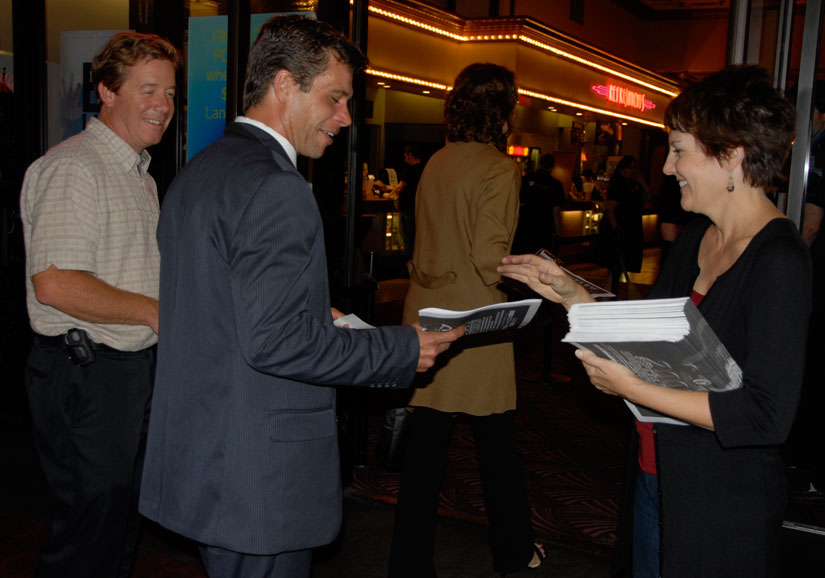
Teresa Malango and the programs
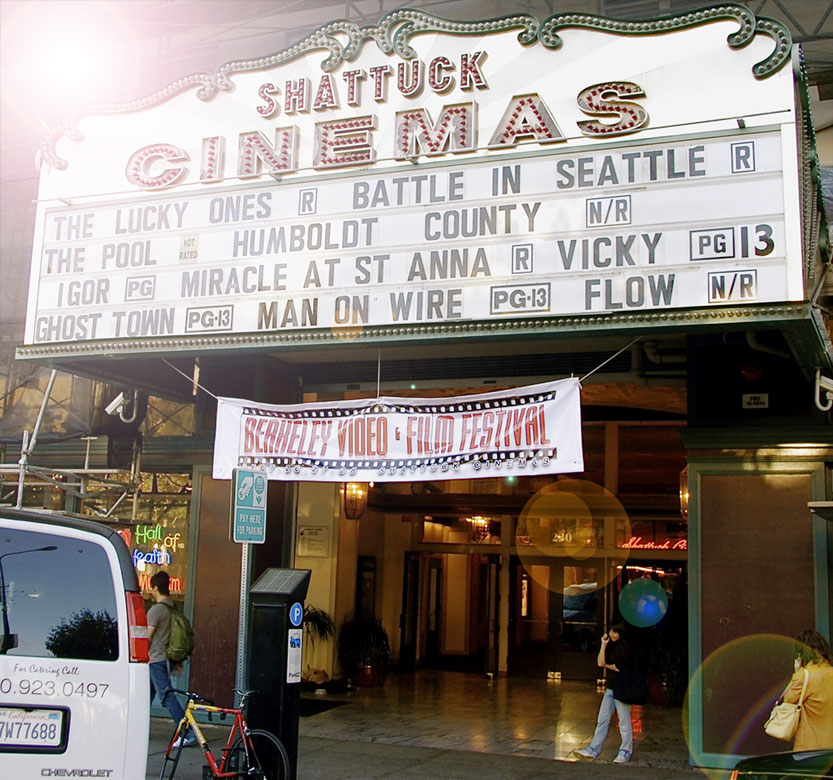
The BVFF at the Shattuck Cinemas
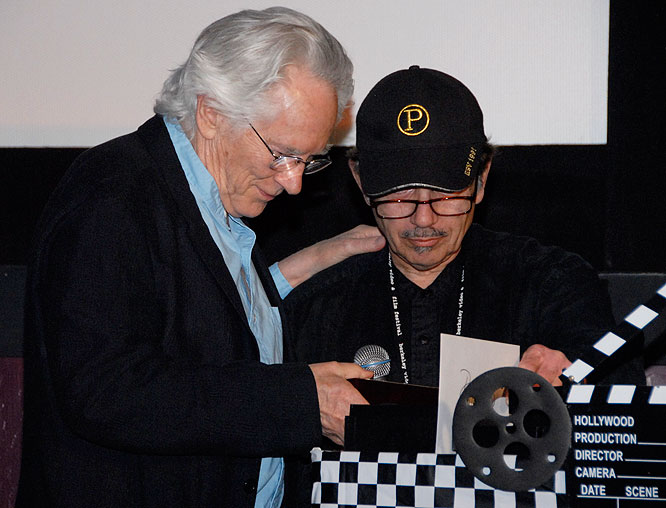
Michael McClure accepts Disc Makers Award & Grand Festival Award for "Rebel Roar: The Sound of Michael McClure" from Mel Vapour, BVFF , Kurt Hemmer and Tom Knoff
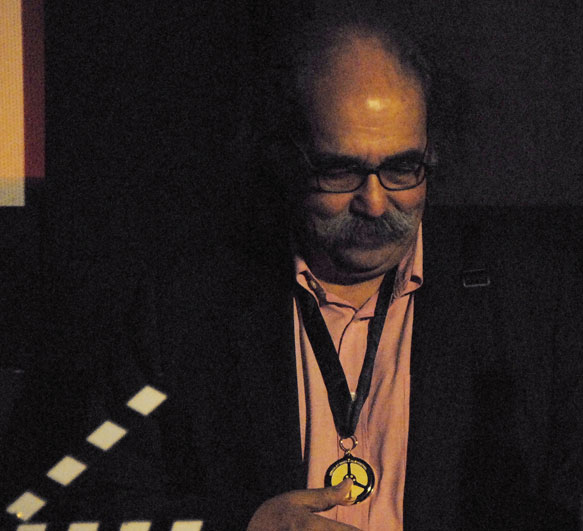
Carlos Flores Delpino, Founder & Director of the Escuela de Cine Chile accepts BVFF Peace Medallion for "Sabado" & "Malta con Huevo"
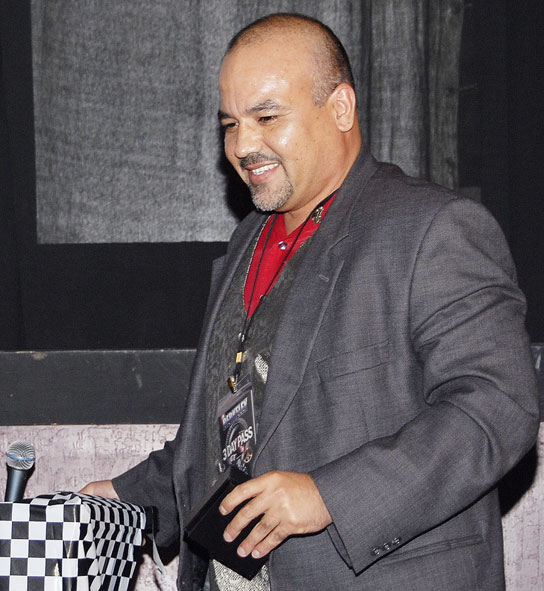
Cecil Hervi aka George Aguilar recieves Peace Medallion
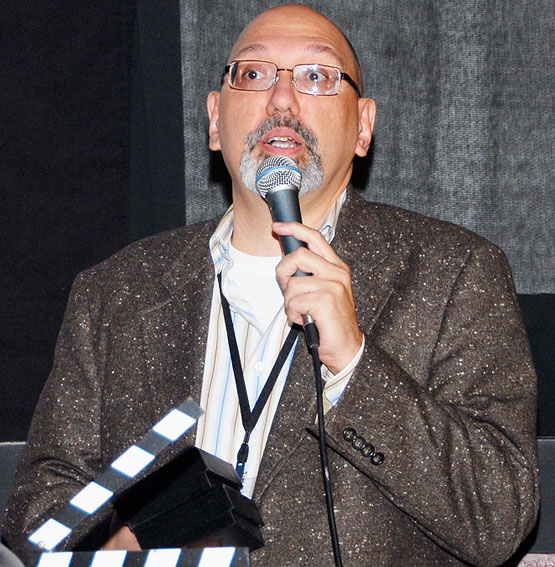
Manny Mendoza receives Grand Festival Award for "Stop the Presses"
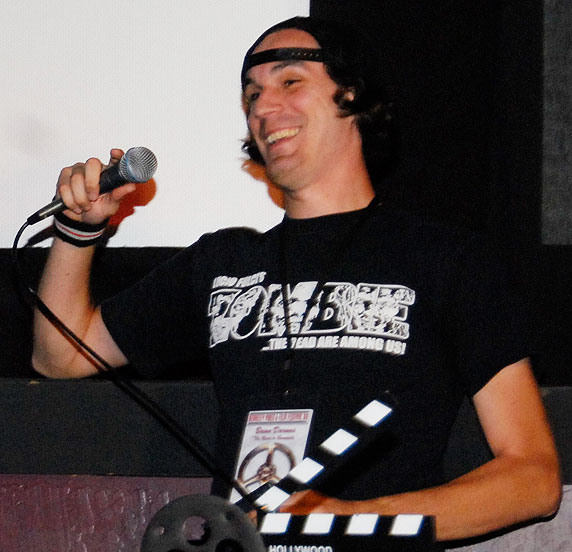
Brian Darwas, Filmmaker-Hot Rod builder,cops the gold for "The Road to Bonneville"
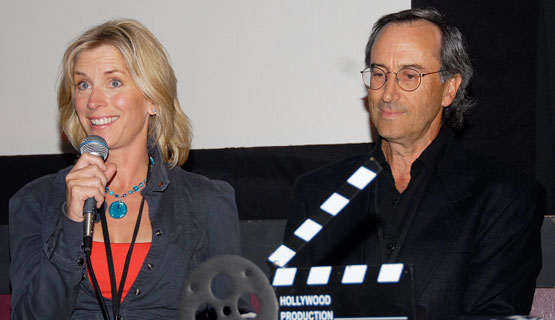
Pam McCann and Don Arbor's "Salam Pax" receive Music Video Grand Festival Award
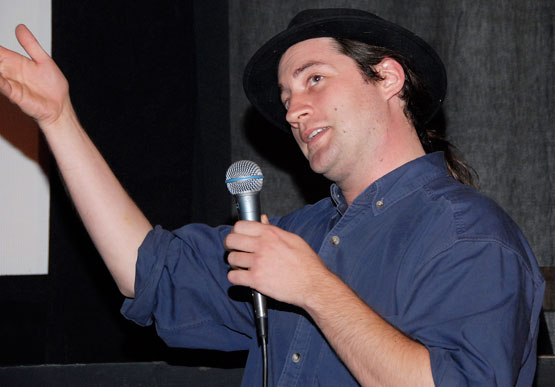
Waylon Bacon for his comedy "BOB" offers free sandwiches to all BVFF filmmakers
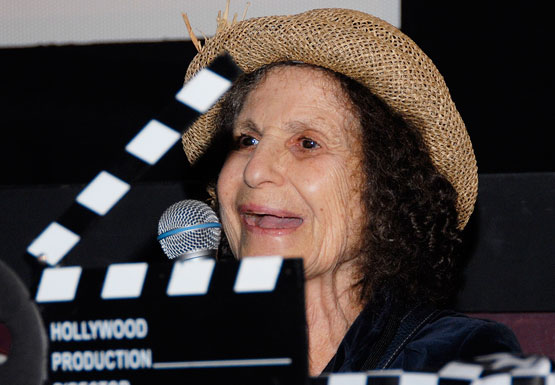
Claire Burch's "The James Baldwin Anthology" gets the Peace Medallion
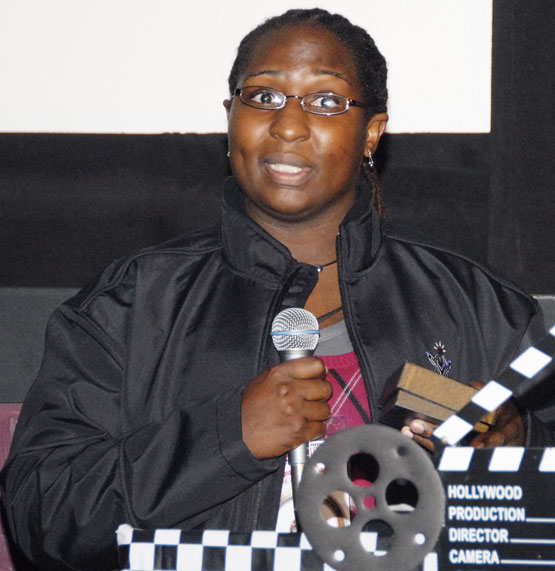
Kenya E. Davis's "Hit, Run & Score" was an audience fave
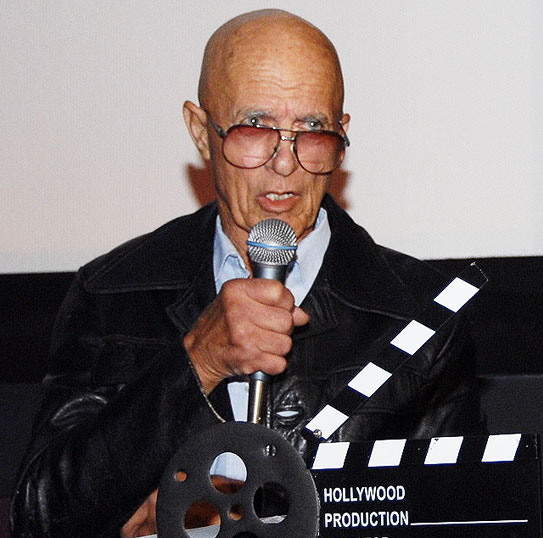
Profesorri Richard Randell graces the awards night
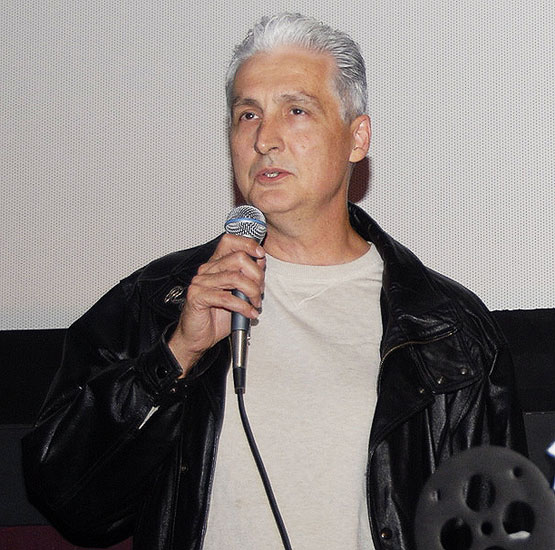
Randy Rice accepts the Peace Medallion for his "Freedom's Song"
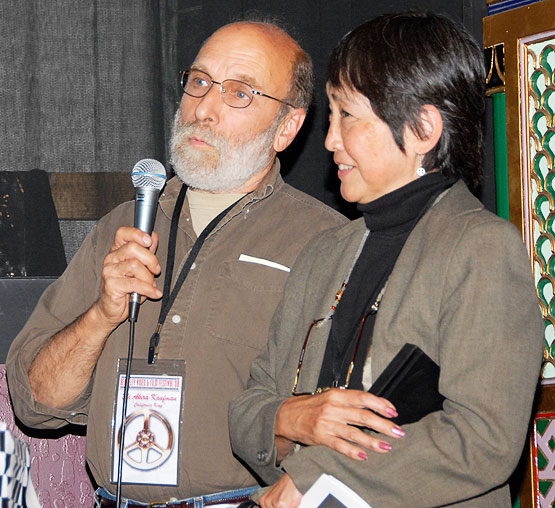
Eli Akira Kaufman's parents accepting his award for "California King"
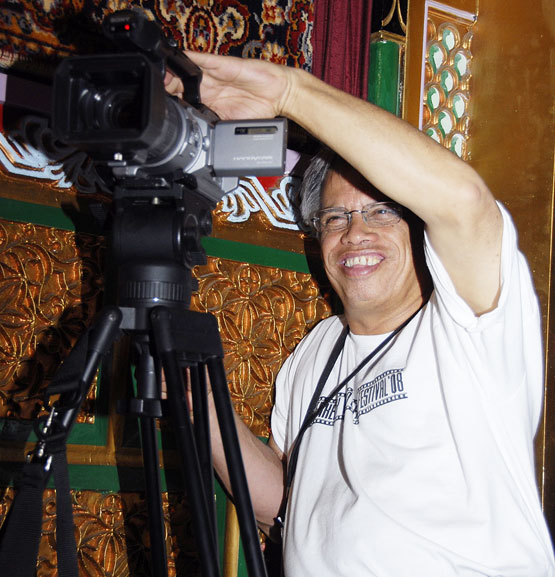
Paul Kealoha Blake, pres. of East Bay Media Center documents the Awards
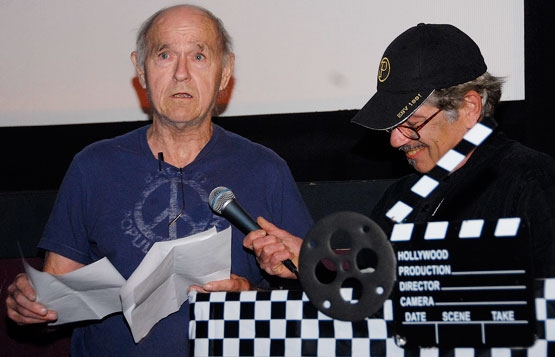
John@Dillinger proclaims "...as I remember, the prizes were a lot bigger last year"
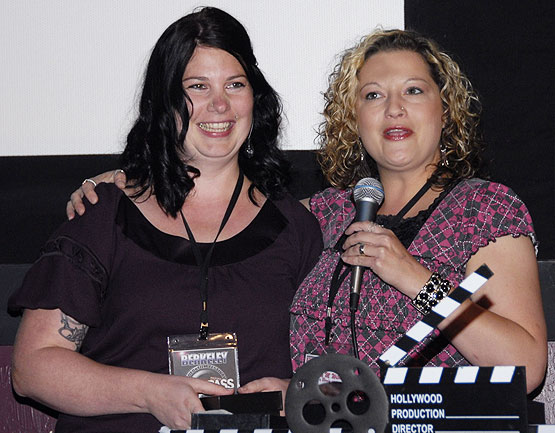
LaDonna M.Witmer and Michelle M. Brown - Arts - Peace Medallions
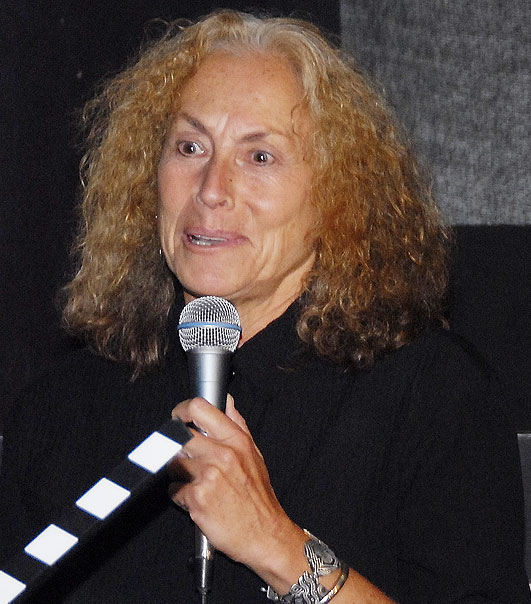
Andrea Heckman accepts Grand Festival Award for her and Tad Fettig's documentary "Ausangate"
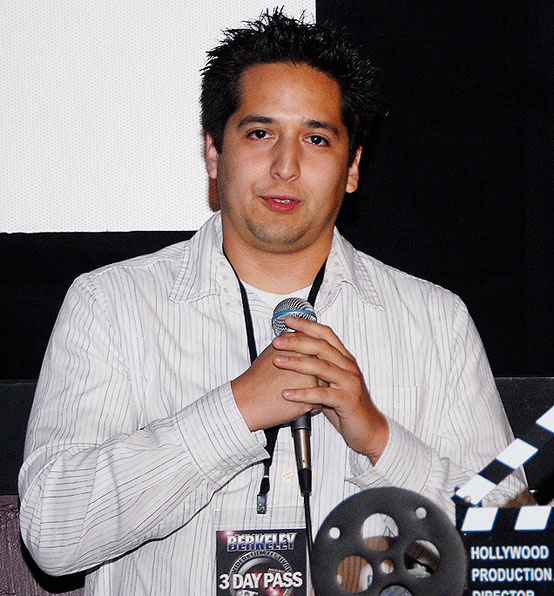
Flying Dork Productions & the San Francisco School of Digital Filmmaking gets gold for "HONOR" in the Student Filmmakers category
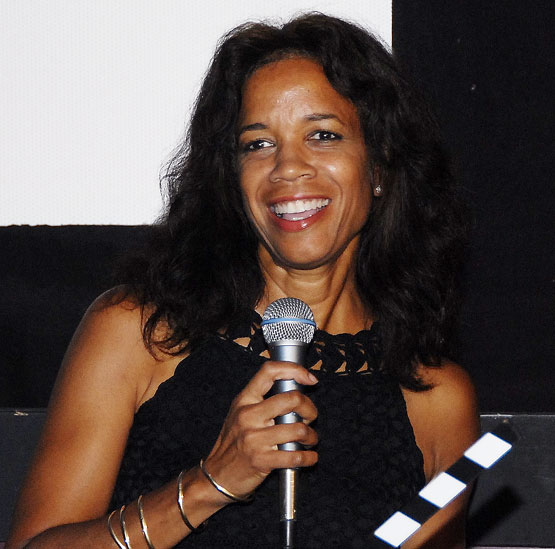
Jan Mabry for "Black August"
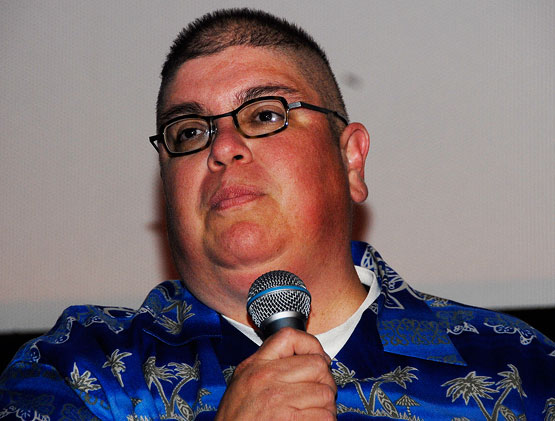
Filmmaker Margo Mercedes Rivera-Weiss accepts Peace Medallion for Ethnographic short "?Tiennes Hambre?
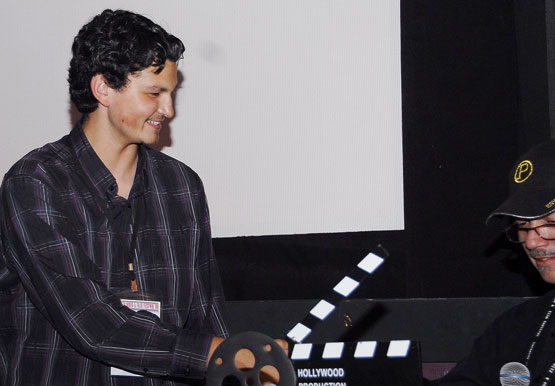
Zack Scott takes home the honors in the Young Producers category for "Jeff Higgins: Dead Blood", he also starred in "The Bourne Legacy" on Saturday
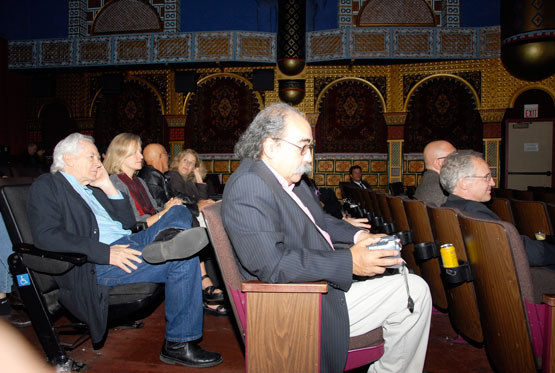
Michael McClure, Amy, Carlos Flores Delpino
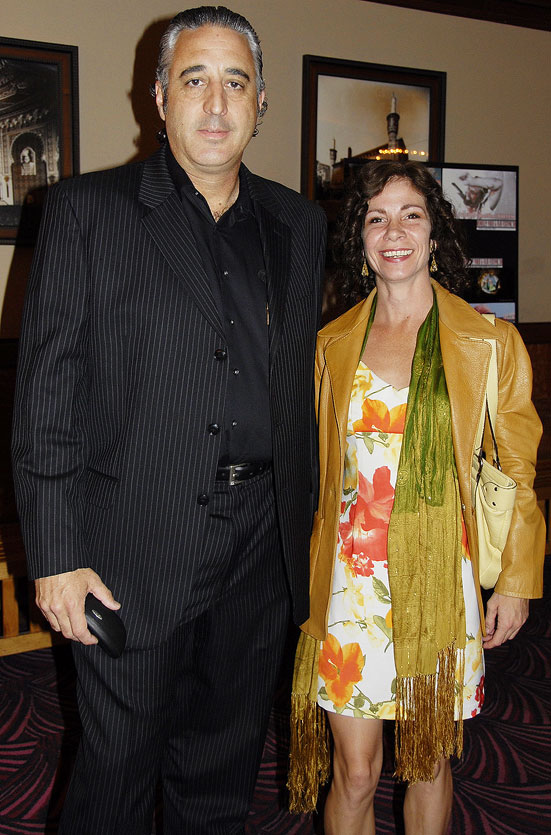
Jazzy Jeff, BVFF '08 Master of Ceremony, and Robbie C Walker

Cocina Poblana did the righteous reception fare - grazi
mas Cocina Poblana courtesy of Lito Aldana
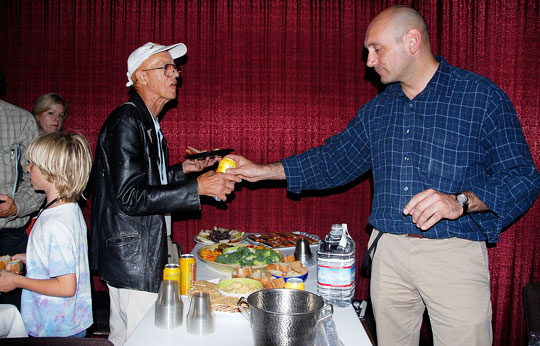
Profesorri Randell and Gerardo Acevedo have a tug 'o war over our sponsors new energy drink, "BRAWNDO" - THE THIRST MUTILATOR, courtesy of head honcho and founder, Pete Hottelet. Thanks Pete!

Kids know best
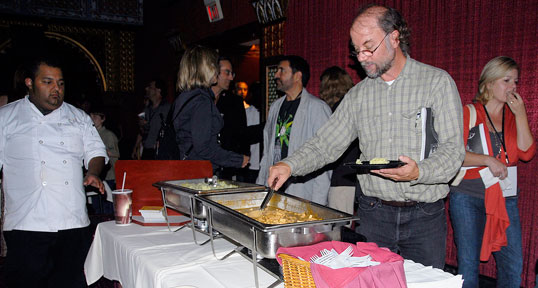
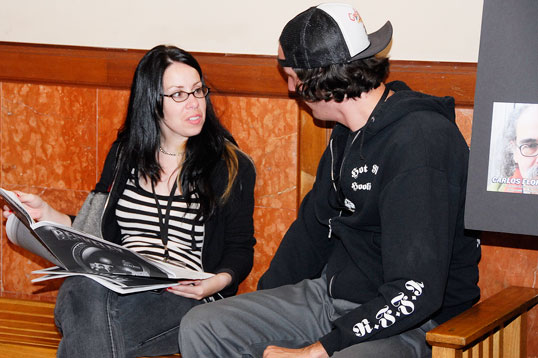
Brian Darwas of "The Road to Bonneville" & friend
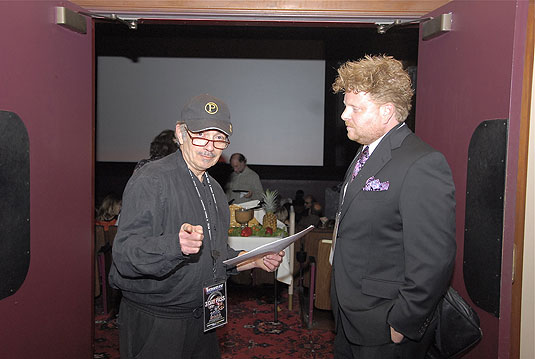
Kurt Hemmer, of "Rebel Roar"and Mel Vapour, BVFF plan "Beat Film Festival"
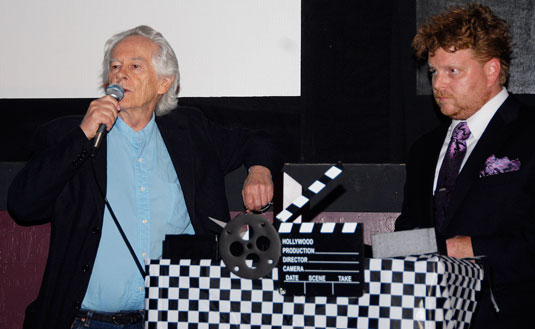
Michael McClure answers audience question, with Professor Kurt Hemmer and Tom Knoff's "Rebel Roar"
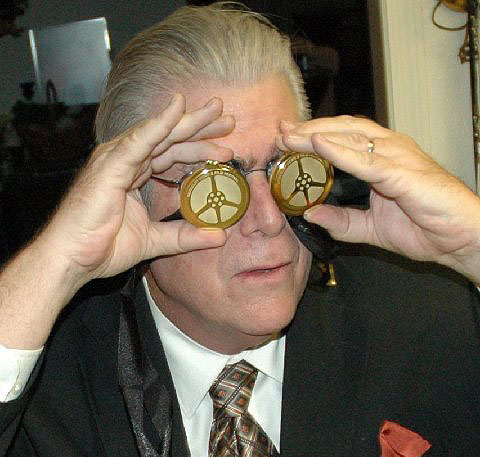
Ed Sharpe of Glendale, Arizona, finds new use for his 2@ Grand Festival Award Medallions this year.
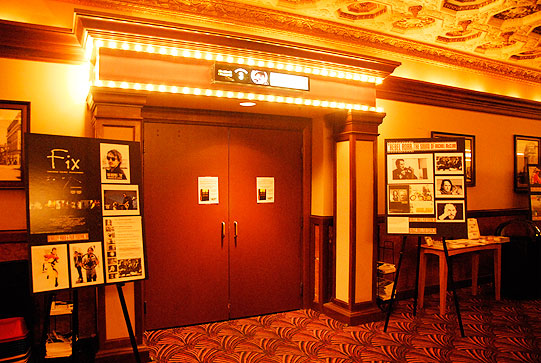
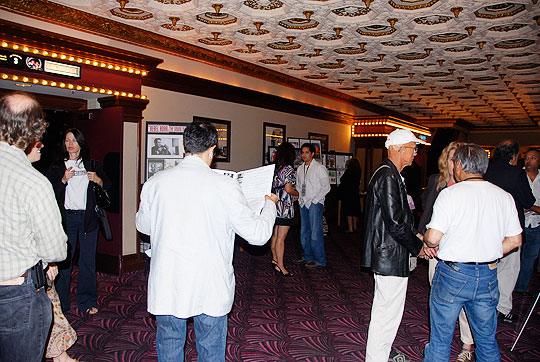
Landmark's Shattuck Cinemas hosted the BVFF 2008
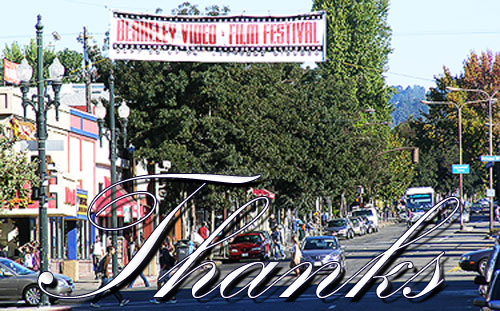
photo courtesy of Will Hubert

Arts & Entertainment:
Berkeley Video and Film Festival
Showcases the Indie Spirit
By Justin DeFreitas - Wednesday September 24, 2008
The 17th annual Berkeley Video and Film Festival features its usual eclectic mix of independent cinema, from The Road to Bonneville, a documentary about hot rod racing in the salt flats of Utah, to George Aguilar’s virtual cinema-poems, with avatar Cecil Hervi roaming the world of Second Life, to California King, a simple tale of budding romance in a mattress showroom.
Time and time again we’ve seen the word “independent” co-opted by the very corporate forces the independents claim independence from: “indie” record labels engulfed by a corporate parent; “indie” film festivals that draw Hollywood’s A-List roster to remote Western boomtowns.
Well, there’s at least one independent film festival that has not only retained its true indie character, but prides itself on a “celebrity-free” environment.
East Bay Media Center’s 17th annual Berkeley Video and Film Festival starts Saturday at Landmark’s Shattuck Cinemas in downtown Berkeley, running Friday through Sunday and screening more than 50 films. Shows start at 7:30 p.m. Friday and at 1 p.m. on Saturday and Sunday, and continues to nearly midnight each night.
This year’s program features the usual eclectic blend of wide-ranging fare, from student films to experimental short subjects to feature-length films with a high-gloss sheen—all of them truly independent and all of them unlike anything showing at your local megaplex.
Things get off to an offbeat start Friday with Emma Strebel’s 45-second Self Portrait, an art project she says developed from “a radical intervention to remedy my head lice.” Get your popcorn early.
Next up is Eli Akira Kaufman’s California King, a surprisingly moving tale of a mattress salesman who uses his lofty position to bed his more attractive female customers. That is, until he meets one that stirs more than his libido. Like a minimalist short story, the 22-minute California King manages to convey much about its characters with little or no background information; we know their states of mind without needing to know the details. It’s a pared-down love story, with no frills and really no surprises; it simply tells a simple story well.
Another short subject, Attila Szasz’s Now You See Me, Now You Don’t (30 minutes) takes us in another direction entirely with a story that employs a touch of science fiction in a sort of dark parable of marriage and parenthood. When a work-a-holic scientist uses a formula to make his son invisible, he widens the rift between father and mother and child with tragic results.
Screening between those two short films are two even shorter films, together adding up to just five minutes, but which open up a brand new world of filmmaking. George Aguilar, who created one of the best films in last year’s festival (The Diary of Niclas Gheiler), returns with two examples from his series of virtual films. Aguilar has immersed himself in the online world of Second Life and has used his avatar, artist-borg Cecil Hirvi, to create a series of cinematic poems. The first film, Virtual Starry Night, shows Hirvi stepping into a 3-D world constructed by Second Life users based on the paintings of Vincent Van Gogh. The second film, First Love of a Borg, consists of camera movements that sensually trace the contours of a metallic sculpture of a ballerina on display in a virtual museum.
Festival director Mel Vapour may have to put an asterisk behind his “celebrity-free” claim this year when poet Michael McClure makes an appearance Friday night. McClure will be on hand to answer questions following a screening of Rebel Roar: The Sound of Michael McClure, a 34-minute film that features that Beat Generation poet reading his own work and offering perspectives on his contemporaries.
The festival’s opening night concludes with Fix (93 minutes), a feature by Tao Ruspoli. Shawn Andrews carries the film with a charismatic performance and a devilish grin that conveys love and arrogance and dissipation all at once. The film’s conceit—a cinephile films every aspect of his life, even as he ventures to Los Angeles to bail his drug-addict brother out of jail and get him into rehab—wears thin after a while, as the device of the first-person camera requires that much screen time be spent defending and justifying it. And the technique lends far less sympathy to the characterizations than Ruspoli probably hoped for. But when it works it strikes an almost voyeuristic tone that makes some scenes come to life.
Saturday’s screenings include two documentaries. The first, Road to Bonneville (60 minutes), follows two hot-rod builders as they trek across the country in their homemade vintage race cars to the salt flats of Utah, spouting homespun, geeked-out hot rod jargon all the way. Documentaries can bring us into close contact with subcultures we might never otherwise encounter, and Road to Bonneville does just that, giving us a glimpse of a unique and highly specialized world.
Stop the Presses (80 minutes) is another kind of documentary, giving us an extensive cataloging of a vexing societal problem, in this case the slow-motion death spiral of the newspaper industry. Mark Birnbaum and Manny Mendoza traveled the country and conducted more than 100 interviews to produce this examination of the shifting American media landscape and what it portends for the future, for an informed citizenry, and for the First Amendment. It’s hardly news to news industry insiders of course, but it elucidates for the uninformed the ramifications for democracy once the watchdogs have been put down.
Tate Taylor’s feature Pretty Ugly People (100 minutes) closes out the festival’s second night. An animated prologue introduces us to Lucy, an overweight woman who undergoes gastric bypass surgery and stages a dramatic reunion to surprise her friends with her new body. But while attempting to enjoy the good and svelte life with them on an extended camping trip, a series of encounters with each friend’s dark side shows her that life isn’t necessarily all that better for the trim and fit.
Also included in this year’s program are two Chilean features. Just to make things confusing, Sabado screens on Domingo, depicting a real-time drama of a marriage that falls apart just as it is about to begin. The film, with the exception of a single edit, appears to be shot in real time, using its 63 minutes to follow a would-be bride as she discovers her fiancé’s secret, confronts him with it, and then concocts a plan for moving forward, documenting it all with the help of a student cameraman. As with Fix, the first-person camera can be trying at times, and again the script and actors are called upon to continually justify its presence, but it adds up to a fun little experiment in cinema verite.
The best feature film of the festival is also the strangest. Malta con Huevo is another Chilean entry and it’s quirky from the start as Vladimir, a sketchy cad-about-town, wakes up to find that he has somehow jumped ahead in time a few weeks. Yet when he sleeps and wakes again, he’s back where he began, and no one seems to know what he’s blathering about. We suspect early enough that his signature beverage of malt beer and raw eggs is playing tricks on his mind, but soon enough the film takes a stark left turn as a more nefarious and absurd comic-horror plot reveals itself.
BERKELEY VIDEO & FILM FESTIVAL - EAST BAY EXPRESS - by KELLY VANCE
Who says San Francisco gets all the most interesting indie one-off film events? Here are three must-sees, two this week and one on the near horizon:
Mel Vapour's always provocative Berkeley Video & Film Festival is everything an event with that name ought to be: unpredictable, left-of-center, and a bit obscure. It takes place Friday through Sunday, September 26-28, at the Shattuck, and if you only have time to see one, make it Tao Ruspoli's Fix, with actor Shawn Andrews (Dazed and Confused, Big Heart City) burning a hole in the screen as Leo, the most charmingly unhinged speedball-shooting addict you'd never want to live with — but he's hilarious at a distance. Director Ruspoli is a story unto himself, says Vapour. Tao is the son of actor Dado Ruspoli (The Godfather: Part III) and the son-in-law of writer Andrew Cockburn. Also stick around for two eye-opening Chilean films — Cristóbal Valderrama's sci-fi slacker comedy Malta con Huevo and Sábado, a real-time, handheld pre-marital drama by Matías Bize and his Santiago friends — plus the useful doc Stop the Presses: The American Newspaper in Peril and the bio-doc Rebel Roar: The Sound of Michael McClure, with that legendary beatnik poet/playwright in person.
..................................................................................................................
filmflick.com
A viceral new feature called “Fix” and the world premiere of “Rebel Roar: The Sound of Michael McClure” were the highlights of the Berkeley Video & Film Festival’s opening night.
I’ll admit the English major in me was drawn by the promise of an appearance by Michael McClure, the beat legend which the festival literature proudly hail as “America’s greatest living poet.” That’s debatable. Luckily, I arrived in time to see the whole slew of films that made up opening night.
The festival opened with Emma Strebel’s Self Portrait, a time lapse look at regrowing hair after a lice induced shaving. Short and sweet, I particularly enjoyed how the filmmaker changed scenery and angles while still matching framing quite well. A fun first act for the festival. Next came California King by Eli Akira Kaufman, a charming tale about a sleazy mattress salesman who meets his match. The acting in this film was just right; it could’ve easily gone poorly one way or the other, and I give the director high marks for making me care about that salesman. Sometimes, it’s so easy to judge someone by your first knowledge of them or the stereotype they bring to your mind. The first scene almost forces you to judge the salesman by showing his ordinary world, but we also catch glimpses of his dissatisfaction which humanizes him. Ultimately, we realize that everyone, this salesman included, wishes they were different sometimes, wishes that they could change things, and that we always have a choice, just like he does.
I can’t say I cared much for the next selection LaDonna Wittmer’s Abattoir, a cinepoem. Perhaps, it’s just poetry that’s too obtuse to take in on a first setting, but it seemed to be very much a cycle of life poem. The bloody images coupled with the reading were distracting to me, and while they emphasized the theme, the poem was lost for me in the images, which was disappointing. The credits were actually more entertaining than the film. To each his own, though, I’m certain it will connect with its audience.
The next film was Cecil Hervi: Virtual Starry Night & 1st Love of a Borg by George Aguilar. Puzzling. This was a Second Life film, meaning the online video game, promotional 3-D entity thing. Never really got into it, but some people really dig it, apparently our Cecil Hervi Borg is one. The “machinima” film places the viewer in some 3-D representations of Van Gogh’s work, oddly displaced by the fact it’s a Borg walking around in this famous painting. It’s such a juxtaposition to see a Borg sitting at Vincent’s cafe, pondering the beauty of it all. Machine, art, beauty, the realization of art through machines, machinima, why not machines appreciating art next? I wasn’t sure how I felt until the film lapsed into a lingering set of shots of a 3-D statue which I couldn’t identify. Actually looking, really going over the sculpture again and again, made me realize how artful this machine representation really was. I’m not going to start using Second Life, maybe. A interesting work for sure.
The US premiere of Now You See Me, Now You Don’t sucked me back into the world of human emotion after my brief Borg trip. The film leads you questioningly into its story, although the ending became a bit predictable toward the end. It was beautifully shot however, using some seriously low depth of field to obscure the characters and setting. It matched the film and its themes perfectly and I loved the cinematography and direction. The short Check Brights was up next and it seemed to be an “I wish” movie, made more to get out something that someone wanted to do, but wasn’t legal, an artistic outpouring of desire for unreasonable justice. A bit long though and also predictable.
Finally, we get to “Rebel Roar: The Sound of Michael McClure” a film by Kurt Hemmer, Tom Knoff & Michael McClure, which is a short anthology/biography mix about McClure’s life and poetry, featuring him reading some of his favorite works by a variety of authors. Unlike the aforementioned cinepoem, this film used aesthetics that allowed the readings and poetry to fill its space and take over the viewer. It used stills in a slow and deliberate manner when not focusing directly on the reader. It adopts an interlaced style for certain “past” footage which adds to the desaturated tone of the film. The words become color and I thought it was a great choice. I always did love Blake and I was happy to see a devotion to him I hadn’t expected from McClure. Don’t miss it if you love art. We were also treated to a reading after the film, which was the highlight of the evening for me.
A close second to that was Tao Ruspoli’s Fix, the final film of the evening and only feature. The film follows a road trip meets time-based-deadline-to-raise-money format, all set in the underbelly of Los Angeles. Despite these somewhat used themes, I predict this film will go far. It has charismatic performances from sympathetic characters, a visceral style of cinematography which feels like cinema verite, and a real-ness that reminds me in some ways of Kids. It has a point but doesn’t beat you over the head with it and you can see things from everyone’s perspective. The film is literally shot from the view of one of the main characters, who is a filmmaker who always has a camera in his hand. He is the constant observer to life, while his brother the addict lives his life for each moment eschewing responsibility (from a certain viewpoint) for the most part. The family dynamic, the ponderings on love from many angles, and the way the characters learn from each other give the film an energizing feralness that you don’t often find in cinema today. I want to watch it again, if just for Shawn Andrews’ performance.
by Christopher Potter, FilmClick.com producer








































